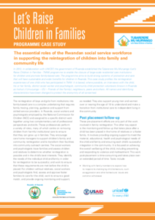Displaying 41 - 50 of 230
This research examined the impact of individual and relational characteristics of foster parents on permanency outcomes for children in care.
The present study is the largest and most rigorous study to date on the effects of being appointed a Court Appointed Special Advocate (CASA) on permanency outcomes of children in foster care.
This video shares insights from the Angkor Hospital for Children social work unit’s key learning around what leads to abandonment, how to work with families to identify and solve underlying issues, how to engage and communicate with families and how to identify risk indicators for abandonment.
Comprised of 12 videos and accompanying discussion guides, this video series features the learning from practitioners working across a range of care-related programs and practices in Cambodia.
In this qualitative study, attorneys, caseworkers, managers, and service providers from four jurisdictions are interviewed to understand practice and decision-making in reunification case planning and service delivery.
This paper focuses on qualitative findings on how young people in long-term foster care in Ireland interpret permanence and stability.
These Case Management Minimum Indicators provide measurable benchmarks to assess the quality of case management in humanitarian crises.
This paper explores the usefulness of undertaking a longitudinal analysis of administrative data on children in care at local authority level to determine the care pathways for children entering care, differentiating by age at entry.
This theoretical paper focuses on early-stage planning in young adults in transition from out-of-home care in the UK.
This case study profiles the reintegration experiences of one child who has participated in the Tubarerere Mu Muryango (Let’s Raise Children in Families - TMM) programme in Rwanda.

